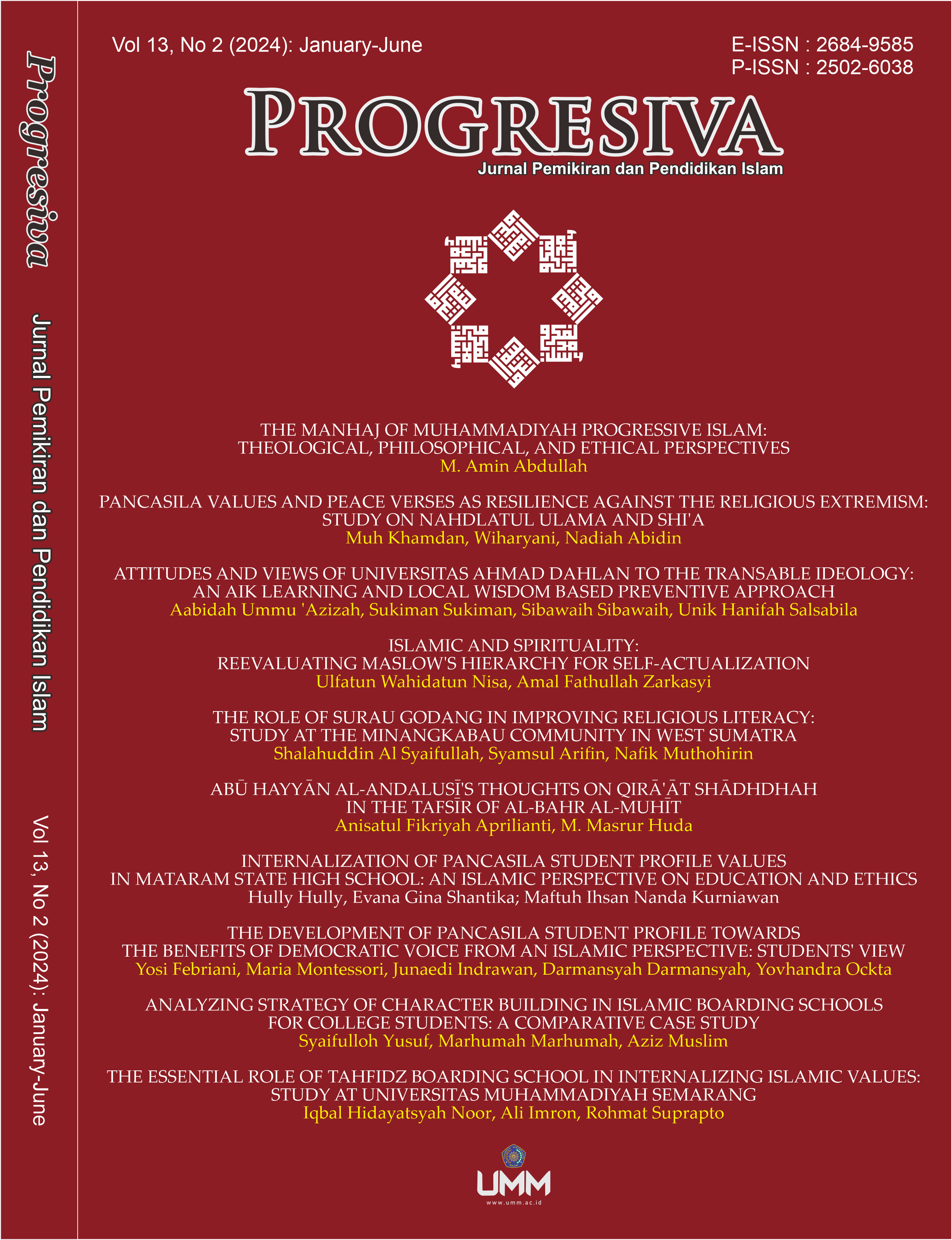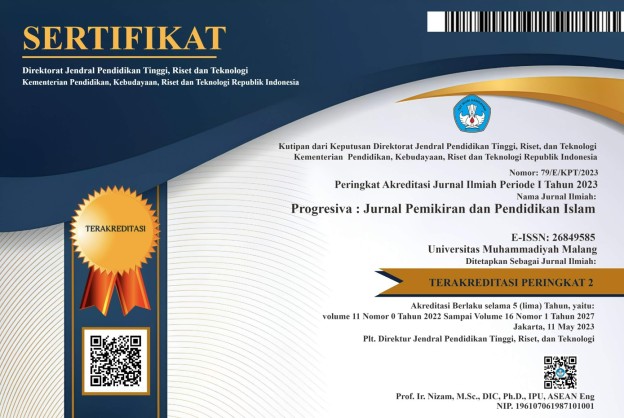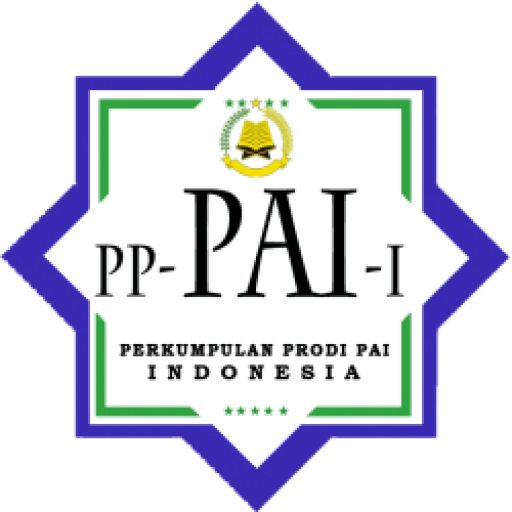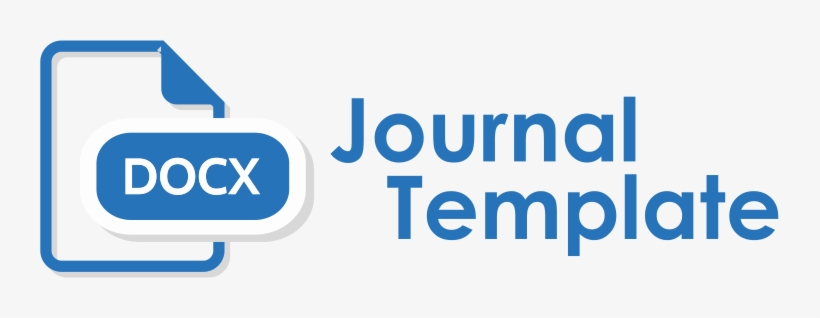Internalization of Pancasila Student Profile Values in Mataram State High School: An Islamic Perspective on Education and Ethics
DOI:
https://doi.org/10.22219/progresiva.v13i02.35375Keywords:
Character Building, Ethics, Islamic Education, PancasilaAbstract
This research aims to study and analyze the internalization of Pancasila student profile values from the perspective of Islamic education and character in high school. The research method used is qualitative research with data collection techniques using observation, interviews, and documentation. Data was analyzed by employing the Miles and Huberman model, starting with data collection, condensation, and display and concluding. Diligent observation, extended participation, references, and triangulation ensure the validity of the data. The formulation of the problem in this research is how to internalize the values of the Pancasila student profile in Islamic religious education and character in high school. The results of this research can conclude that the internalization of Pancasila student profile values in perspective Islamic education and character at school was carried out by planning as an initial step, such as preparing learning tools in the form of teaching modules with independent implementation. Curriculum starting in 2021 and second, implementing learning as a core activity in internalizing the values of the Pancasila student profile in learning Islamic religious education and character at school, which includes values such as the value of faith and devotion to God Almighty, as well as having noble morals, the value of cooperation, critical reasoning, creative values, and the value of Independence. Third, evaluation of the internalization of Pancasila student profile values in perspective Islamic education and character at school includes evaluating attitudes, knowledge, and skills through oral, written, portfolio, and self-assessment tests for students at school.
Downloads
References
A’yun, Q., Indriani, S. M., Anugrah, V., Amelia, V., Khoiri, M. M., & Wahyudi. (2022). Penanaman Nilai Beriman Bertakwa kepada Tuhan Yang Maha Esa dan Berakhlak Mulia Profil Pelajar Pancasila Melalui Kegiatan Pembiasaan Siswa di MTs Al-Ma’arif 03 Singosari. TABYIN: Jurnal Pendidikan Islam, 4(2). https://doi.org/10.52166/tabyin.v4i2.194
Ali, M., & Asrori, M. (2014). Psikologi remaja : perkembangan peserta didik (3rd ed.). Bumi Aksara.
Badrun, B., Sujadi, S., Warsah, I., Muttaqin, I., & Morganna, R. (2023). Pancasila, Islam, and Harmonising Socio-Cultural Conflict in Indonesia. Al-Jami’ah: Journal of Islamic Studies, 61(1), 137–156. https://doi.org/10.14421/ajis.2023.611.137-156
Bahasa, T. P. K. P. P. dan P. (2020). Kamus Besar Bahasa Indonesia. Balai Pustaka.
Castellví, J., Massip Sabater, M., González-Valencia, G. A., & Santisteban, A. (2022). Future teachers confronting extremism and hate speech. Humanities and Social Sciences Communications, 9(1), 201. https://doi.org/10.1057/s41599-022-01222-4
Daradjat, Z. (2023). Islamic Education Sciences. Bumi Aksara.
Direktorat KSKK, M. (2022). Panduan Pengembangan Projek Penguatan Profil Pelajar Pancasila dan profil Pelajar Rahmatan Lil Alamin. Kementerian Pendidikan Dan Kebudayaan, 1–108.
Faizi, F. (2023). Moderating Resistances: The Reproduction of Muslim Religious Space in the Dutch East Indies. Al-Jami’ah: Journal of Islamic Studies, 61(2), 297–328. https://doi.org/10.14421/ajis.2023.612.297-328
Indonesia, P. P. R. (2005). Peraturan Pemerintah Tentang Standar Nasional Pendidikan (PP no. 19 tahun 2005). Sekretariat Negara Indonesia, 1, 1–95.
Jarman Arroisi, Zarkasyi, H. F., Iwan Aminur Rokhman, & Fahrudin Mukhlis. (2023). Pursuit of Spiritual Happiness: Abu Hamid al-Ghazali on The Theory of Human Nature. Progresiva : Jurnal Pemikiran Dan Pendidikan Islam, 12(02), 291–306. https://doi.org/10.22219/progresiva.v12i02.29265
Kahfi, A. (2022). IMPLEMENTASI PROFIL PELAJAR PANCASILA DAN IMPLIKASINYA TERHADAP KARAKTER SISWA DI SEKOLAH. Dirasah: Jurnal Pemikiran Dan Pendidikan Dasar Islam, 5(2), 138–151. https://doi.org/10.51476/dirasah.v5i2.402
Karstedt, S. (2003). Terrorism and “New Wars” in 11 September 2001: War, Terror and Judgement (E. B. G. and R. B. J. Walker (ed.)). Frank Cass Publishers.
Kementrian Pendidikan dan Kebudayaan, P. R. I. (2021). PERATURAN SEKRETARIS JENDERAL KEMENTERIAN PENDIDIKAN, KEBUDAYAAN, RISET, DAN TEKNOLOGI NOMOR 22 TAHUN 2021 TENTANG PERUBAHAN ATAS PERATURAN SEKRETARIS JENDERAL KEMENTERIAN PENDIDIKAN DAN KEBUDAYAAN NOMOR 2 TAHUN 2021 TENTANG PETUNJUK PELAKSANAAN PROGRAM I. 4(1), 6.
Kenedi. (2017). Pengembangan Kreativitas Siswa Dalam Proses Pembelajaran Di Kelas II Smp Negeri 3 Rokan IV Koto. Suara Guru : Jurnal Ilmu Pendidikan Sosial, Sains, Dan Humaniora, 3(2), 329–347. https://doi.org/http://dx.doi.org/10.24014/suara%20guru.v3i2.3610
L, I. (2019). EVALUASI DALAM PROSES PEMBELAJARAN. Adaara: Jurnal Manajemen Pendidikan Islam, 9(2), 920–935. https://doi.org/10.35673/ajmpi.v9i2.427
Lesmana, F. R., Rohim, F., & Mukhlis, F. (2023). Relevansi Pendidikan Akhlak Said Nursi di Sd Muhammadiyah Kreatif Kraksaan. Syntax Literate ; Jurnal Ilmiah Indonesia, 8(7), 8426–8452. https://doi.org/10.36418/syntax-literate.v8i7.13262
Lismaya, L. (2020). BERPIKIR KRITIS & PBL: (Pembelajaran Berbasis Masalah). Media Sahabat Cendekia.
Maulida, U. (2022). PENGEMBANGAN MODUL AJAR BERBASIS KURIKULUM MERDEKA. Tarbawi : Jurnal Pemikiran Dan Pendidikan Islam, 5(2), 130–138. https://doi.org/10.51476/tarbawi.v5i2.392
Moleong, L. J. (2002). Metodologi Penelitian Kualitatif. Remaja Rosdakarya.
Mujani, S., Liddle, R. W., & Irvani, D. (2023). Islamism and Muslim Support for Islamist Movement Organizations: Evidence from Indonesia. Studia Islamika, 30(1), 39–63. https://doi.org/10.36712/sdi.v30i1.33369
Mukhlis, F., Yusuf, Z., Wachid, M. S., & Fiadha, A. A. (2023). PENDAMPINGAN LITERASI DIGITAL DAN DAKWAH. Jurnal Aplikasi Dan Inovasi IPTEKS SOLIDITAS, 6, 172–182.
Mulyani, H., Asih, S. R., Alfani, Y., & Nazri. (2022). Analisis Pembagian Jam Pelajaran Berdasarkan Kurikulum Merdeka di SDN 181 Kota Pekanbaru. Jurnal Pendidikan Dan Konseling, 4(6), 12822–12827. https://doi.org/10.31004/jpdk.v4i6.10620
Muthohirin, N. (2014). Fundamentalisme Islam: Gerakan dan Tipologi Pemikiran Aktivis Dakwah Kampus. Indostrategi.
Muthohirin, N. (2019). Politik Identitas Islam dan Urgensi Pendidikan Multikultural. J-PAI: Jurnal Pendidikan Agama Islam, 6(1). https://doi.org/10.18860/jpai.v6i1.8776
Nabila, P. A. D., Humaidi, M. N., & Mukhlis, F. (2023). Pembinaan Karakter Cinta Tanah Air Melalui Habituasi: Sekolah Dasar Islam Terpadu (SDIT) Robbani Malang. Tarlim: Jurnal Pendidikan Agama Islam, 6(2), 149–166.
Permendikbud. (2018). Permendikbud RI No 20 Tahun 2018 tentang Penguatan Pendidikan Karakter pada Satuan Pendidikan Formal. Permendikbud Nomor 20 Tahun 2018 Tentang Penguatan Pendidikan Karakter Pada Satuan Pendidikan Formal, 8–12.
Purnama Wirayuda, R., Hadinata, A., Misrowati, M., Afdian, R., & Meilevia Wijayanti, T. (2024). Pancasila as an Identity That Forms National Character: Analysis of the Philosophy of Indonesian Education. Journal of Basic Education Research, 5(2), 54–60. https://doi.org/10.37251/jber.v5i2.973
Rosmalah, Asriadi, & Shabir, A. (2022). Implementasi Profil Pelajar Pancasila Dimensi Bernalar Kritis dalam Proses Pembelajaran di Sekolah Dasar. Seminar Nasional Hasil Penelitian, 969–975.
Sadri, S., Emawati, E., & Hully, H. (2024). Integration of Pancasila Student Profile Values in Islamic Religious Education (PAI) Learning at SMA Negeri 1 Gerung. Internasional Jurnal of. Education Narratives, 2(1).
Shihab, A. (2019). Islam & Kebhinekaan. Gramedia Pustaka Utama.
Sugiyono. (2021). Metode Penelitian Kuantitatif Kualitatif dan R dan D (Sutopo (ed.); 2nd ed.). Afabeta.
Suhana, A., & Wardani, K. W. (2022). Pengembangan Media Diorama Berbasis Audiovisual untuk Meningkatkan Dimensi Bergotong Royong pada Pembelajaran IPS Materi Tindakan Heroik Mendukung Proklamasi Kemerdekaan Indonesia Kelas V Sekolah Dasar. JIIP - Jurnal Ilmiah Ilmu Pendidikan, 5(12), 5289–5295. https://doi.org/10.54371/jiip.v5i12.1202
Suliyanah, S., Khasanah, U., Alifia, D., Agustinaningrum, N. A., Sabrina, N. M. N., & Deta, U. A. (2023). The Teacher’s Role as an Applicator of “Profil Pelajar Pancasila” in “Merdeka Belajar” Curriculum. International Journal of Research and Community Empowerment, 1(1), 29–32. https://doi.org/10.58706/ijorce.v1n1.p29-32
Suwartini, S. (2017). PENDIDIKAN KARAKTER DAN PEMBANGUNAN SUMBER DAYA MANUSIA KEBERLANJUTAN. Trihayu: Jurnal Pendidikan Ke-SD-An, 4(1), 220–234. https://doi.org/https://doi.org/10.30738/trihayu.v4i1.2119
Syarif, Z., A. Mughni, S., & Hannan, A. (2020). Post-truth and Islamophobia narration in the contemporary Indonesian political constellation. Indonesian Journal of Islam and Muslim Societies, 10(2), 199–225. https://doi.org/10.18326/ijims.v10i2.199-225
Zada, K. (2022). Inclusive Islamic Politics : The Debate of Islam and Pancasila Among the Academic Communities of Islamic Religious Colleges. MIMBAR Agama Budaya, 39(2), 1–14.
Downloads
Published
How to Cite
Issue
Section
License
Copyright (c) 2024 Hully Hully, Evana Gina Shantika; Maftuh Ihsan Nanda Kurniawan

This work is licensed under a Creative Commons Attribution-ShareAlike 4.0 International License.


















